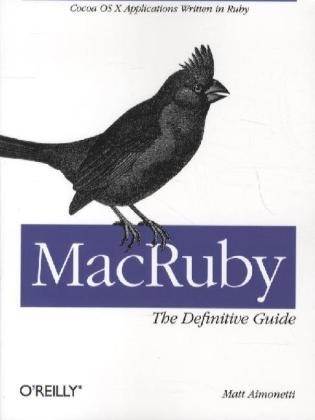Read more
Want to build native Mac OS X applications with a sleek, developer-friendly alternative to Objective-C? MacRuby is an ideal choice. This in-depth guide shows you how Apple's implementation of Ruby gives you access to all the features available to Objective-C programmers. You'll get clear, detailed explanations of MacRuby, including quick programming techniques such as prototyping.
Perfect for programmers at any level, this book is packed with code samples and complete project examples. If you use Ruby, you can tap your skills to take advantage of Interface Builder, Cocoa libraries, the Objective-C runtime, and more. If you're a Cocoa developer, you'll learn how to improve your productivity with MacRuby. Get up to speed on MacRuby basics, including classes and methods Learn how to use MacRuby with Apple's Xcode developer suite Delve into the primitive object classes and data types in Foundation Kit Build event-driven user interfaces with the AppKit framework Handle relational object persistence with the Core Data framework Use advanced MacRuby techniques, including concurrency and sandboxing Get examples for applications using Twitter and a location web service Embed MacRuby into existing Objective-C applications
List of contents
Dedication;
Preface;
The Purpose of This Book;
Prerequisites;
Conventions Used in This Book;
Using Code Examples;
Safari® Books Online;
How to Contact Us;
Acknowledgments;
MacRuby Overview;
Chapter 1: Introduction;
1.1 Introducing MacRuby;
1.2 Installation;
1.3 Code Example;
1.4 Loading a Framework;
1.5 Using Classes;
1.6 Methods;
Chapter 2: Fundamentals;
2.1 Run Loops;
2.2 Callbacks/Delegation;
2.3 User Inputs;
2.4 Outlets;
2.5 Display;
2.6 Example;
Chapter 3: The Cocoa Environment;
3.1 History;
3.2 Main Frameworks in the Cocoa API;
3.3 Reference Library;
3.4 Mutability;
Chapter 4: Foundation;
4.1 Compatibility Table;
4.2 Strings and Attributed Strings;
4.3 Arrays;
4.4 Hashes/Dictionaries;
4.5 Sets;
4.6 Enumerators;
4.7 Date, Time, and Calendars;
4.8 Data;
4.9 Locales;
4.10 Time Zones;
4.11 Exceptions;
4.12 I/O;
4.13 URLs/Requests/Connections;
4.14 Pipes;
4.15 File Handles;
4.16 Bundles;
4.17 Scheduling;
4.18 Notifications;
4.19 Archiving and Serialization;
4.20 Miscellaneous Classes;
Chapter 5: Application Kit;
5.1 Cocoa Key Principles;
5.2 User Interface;
Chapter 6: Xcode;
6.1 Xcode IDE;
Chapter 7: Core Data;
7.1 Data Model;
7.2 User Interface;
7.3 Persistence;
Chapter 8: One Step Deeper;
8.1 Selectors;
8.2 Blocks;
8.3 Concurrency;
8.4 Sandboxing;
8.5 Using Objective-C or C Code;
8.6 Scriptable Applications;
8.7 Method Missing;
8.8 Pointers;
8.9 Compilation;
8.10 Compilation Within Xcode;
MacRuby in Practice;
Chapter 9: Address Book Example;
9.1 User Interface;
9.2 Address Book;
9.3 Web API Call;
9.4 Cleaning Up: Better Management of Widgets;
9.5 The Extra Mile: Displaying More Information Through Notifications;
Chapter 10: Geolocation;
10.1 User Interface;
10.2 Table View;
10.3 Core Location;
10.4 Web API;
Chapter 11: MacRuby in Objective-C Projects;
11.1 API;
11.2 Usage;
11.3 Example in an Xcode Project;
Chapter 12: Objective-C Code in MacRuby Apps;
12.1 Dynamic Library;
12.2 Framework;
Chapter 13: Using Ruby Third-Party Libraries;
13.1 RubyGems;
13.2 MacRuby Deploy;
Index;
Colophon;
About the author
Matt Aimonetti is a Rails veteran, serious Ruby addict, and a MacRuby, Merb, and Rails Team member. Matt runs m a agile, a consulting shop offering training, audit and development focused on Ruby. He's one of the lead contributors for MacRuby, and consults for companies as diverse as Marvel Comics and "big pharma."
Summary
Want to develop apps for the iPhone and iPad, but prefer to use a friendly language like Ruby? This in-depth guide shows you how MacRuby puts the power of Apple's development tools right at your fingertips.

